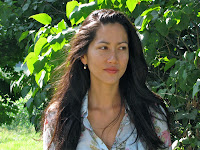07 Mar Frances Ya-Chu Cowhig – The World of Extreme Happiness
I like to give my self challenges when writing a play, challenges that become  writing constraints and help me stay focused and centered on why I am spending three or more years of my life alone and going broke in service to words on paper. The World of Extreme Happiness started when I received an Emerging Artists commission from South Coast Rep in early 2010. After receiving the commission, I had a conversation with the literary staff about the kind of play I wanted to write — and also, to get a sense of the kind of plays they tended to produce – with the goal of finding a match between what I wanted to write and what they were interested in producing.
writing constraints and help me stay focused and centered on why I am spending three or more years of my life alone and going broke in service to words on paper. The World of Extreme Happiness started when I received an Emerging Artists commission from South Coast Rep in early 2010. After receiving the commission, I had a conversation with the literary staff about the kind of play I wanted to write — and also, to get a sense of the kind of plays they tended to produce – with the goal of finding a match between what I wanted to write and what they were interested in producing.
I lived in mainland China 1996-2001, from the ages of 13-18, while my father worked in the Environment, Science and Technology section of the US Embassy in Beijing. I lived in Taiwan for two years before that, and my mother is from the countryside. She was the first person in her village to go to a four-year college. Her mother, my amah, never learned to read – even though amah’s father wanted her to go to school, amah’s mother refused to allow her to go, insisting that girls shouldn’t receive education. I lived in a diplomatic compound in Beijing, and went to school with the sons and daughters of diplomats, UN employees, consultants and employees of multi-national companies – but despite being in a cloistered ‘expatriate bubble’ – the world of the ‘real China’ – of migrant workers and peasants – was impossible to miss. Outside my compound, cardboard shacks built by migrant workers cropped up beside newly constructed skyscrapers. When Beijing was bidding for the Olympics in 2001, they kicked out a lot of these peasants, and began a surreal process of beautification – seeding the clouds to make it rain, installing fake plastic trees along the road, complete with neon green illumination.
When I think about what I want to write, I think about the things that disappoint, frustrate, anger or excite me, and create a set of constraints and challenges that require that I envision a world in which these emotions are addressed, challenged, or explored: China has the world’s highest female suicide rate. Self-help books are the most popular genre among migrant workers. My amah was prevented from going to school by her own mother. There aren’t many parts written specifically for Asian/Asian-American actors – especially not for women. I have never seen a play about the Chinese underclass. Because of all these things, I told South Coast Rep that I was interested in writing a play about migrant workers in China, one that explored the rural-urban divide. Once I felt emotionally committed to that topic, I then began to do research into this world – with the goal of both opening up my understanding of the issues, and also giving myself a few more constraints.
I bought a copy of Arthur Miller’s essays on theatre in 2010 at the National Theatre of England’s bookshop, and found myself repeatedly drawn to his essay Tragedy and the Common Man – so much so that it created the primary challenge and organizing structure for The World of Extreme Happiness: How can I make an uneducated Chinese girl a tragic hero? Once I had this central question, the path towards executing the play became clearer. I read a series of books about China that blew my mind – Xinran’s Letters from an Unknown Chinese Mother, Leslie T. Chang’s Factory Girls, Liao Yiwu’s Corpsewalker. When I visited my parents in Chengdu one spring I learned that my father knew Liao Yiwu, and through this connection I met several Chinese writers, including Liao, who has since escaped to Germany after years of government persecution and imprisonment for his writing. In my conversations with these writers, I learned about their views of China – Liao sees China as a nation of people with post-traumatic stress disorder because of the population’s experience of terror and starvation during the Cultural Revolution and Great Leap Forward, and uses this to explain the current pursuit of financial prosperity over all other things. I heard them talk about their monthly meetings with Public Security Officers, euphemistically called ‘drinking tea’ – where another Chinese writer, Ran Yunfei, spoke of having to show the police officers the contents of his computer, blog and twitter account, and report on his recent activity.
After finishing the research and selecting the constraints I felt would create the play I would be most excited, challenged and stimulated to write, the real work began. Writing for me is a messy process of vomiting onto a page, cutting away half the vomit, sculpting the rest, vomiting again, doing more research, finding more personal and intimate ways into the characters and relationships, and doing this over and over until I have a draft I can show another living person without feeling complete and abject humiliation.

F r a n c e s Y a – C h u C o w h i g http://www.francesyachucowhig.
Check out Frances’s new play, THE WORLD OF EXTREME HAPPINESS, produced by Playwrights Foundation as part of our Rough Readings Series:
– Monday, March 11 @ 7:30 at Roble Hall, Stanford University
– Tuesday, March 12 @ 7:00 at NOHspace, SF


No Comments